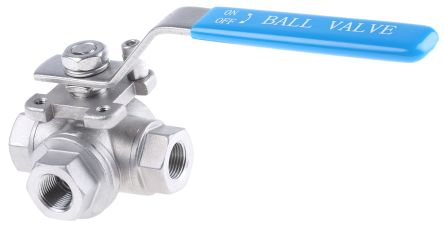The valve industry offers a variety of industrial valves in the market to choose from. They have designated applications where they serve best. Whether it is to cater to the pharmaceutical industry or even manufacturing, there is a valve suitable for every application.

Among the most commonly used valves are ball valves. But little did we know, they have two subtypes which vary in the material used for composition. Steel ball valves and plastic ball valves are two of the subtypes exhibiting exceptional performance in different applications. So which is better, plastic ball valves or steel ball valves?
Understanding Ball Valves
Ball valves are known for their easy quarter-turn control feature. Compared to the different valve types, they are more versatile and resilient during operations. Big industries like pharmaceutical, manufacturing, and petrochemical prefer ball valves because they exhibit excellent durability. They can withstand different environmental conditions which include transport of materials with moderate to high volumes, high pressures and high temperatures.
The composition of the ball valve includes a valve body with a ball-shaped located in the center. The ball in the center is responsible for the enabling and disabling of the flow of materials. They have a hollow cylindrical shape in the center aligned to the pipeline. The ball rotates when opened or closed to regulate or halt transport operations. Ball valves are controlled with a lever-style handle to start or stop the flow of materials.
Steel Ball Valve
Steel ball valves are composed of two different types of stainless steel which are 304 stainless steel and 316 stainless steel. They vary in the amount of chromium and nickel used to produce steel ball valves. The content of type 304 involves 8% of nickel and 18% of chromium. On the other hand, content type 316 involves 10% nickel, 16% chromium, and 2% molybdenum.
The chromium content in stainless steel is what makes them stronger and more durable than other steel types. They also resist possible cases of corrosion which leads to leaks during transport operations. The material composition makes them develop the structure and properties of steel ball valves.
Applications
Steel ball valves are known for a variety of applications which requires resiliency and durability during operations. Here are three industries where steel ball valves are most commonly used.
Brewing System
In the brewing system, steel ball valves are used in kettles for controlled dispensing materials. They ensure that the liquid extracted is of the right amount and of the right temperature. Stainless steel is the most suggested material for valves because the liquid substance they cater to can cause corrosion of any sort.
Seawater Environments
Ball valves are also applied to service desalination where most takes place near seawater areas. The conditions they cater to involve harmful chemicals that can be damaging to all ball valve materials. Compared to other materials, the steel ball valve can perform regardless of extreme pressure and temperature.
Petroleum Refining
Petroleum refining industry involves mostly corrosive materials like carbon dioxide, water, sulfur, and other microorganism types. They choose steel ball valves because compared to other materials, they can survive longer withstanding the pressure and temperature of the flow content.
Advantages
- Low leakage rate
- Tight shut feature
- Good heat conductor
- Chemical and corrosion resistant
- Keeps up with high temperature and pressure requirement
- Reduced required maintenance
- Effortless control
Disadvantages
- High costs in exchange for high quality
- Difficulties in shaping and forming during production
Plastic Ball Valve
Plastic ball valves are considered as the best alternative for stainless steel and brass ball valve. They are commonly made with polyvinyl chloride which is a high-quality component commonly used for piping lines and connecting accessories. Plastic ball valves are very competitive too in terms of utilization. They work for both indoor and outdoor operations. The plastic material used has the advantages that metal made ball valves don’t.
The materials used for plastic ball valves are very distinct considering that they cannot align their properties to high changes in pressure and temperature. Conduct research first if the desired application best suit plastic valves. Compromising the quality of valves used in operations are potential culprits. It would be best to settle with valves with the best quality and suits the application.
Applications
Plastic ball valves are known for a variety of applications which requires efficiency and effectivity during operations. Here are three applications where plastic ball valves are most commonly used.
Food and Beverage Industry
Plastic ball valves are common in the food and beverage industry. They believe these are easier to control making dispensing of materials more convenient. Since they do not require extreme temperature and pressure, they best suit this industry. They are also easy to maintain. Unlike other material types, plastic ball valves are less involved in cases of corrosion.
Swimming Pool Seal
When it comes to clean water control, plastic ball valves are one of the widely used. They provide a tight shut seal to halt the flow of water to the pool. Swimming pool seals do not require high pressure and temperature levels that is why plastic valves are a good substitute.
Advantages
- Lightweight valves
- Cost-effective
- Durable design
- Better resistance to corrosion
- Compatible with a variety of chemicals
Disadvantages
- Not compatible with industries requiring high pressure
- High temperature affects the lifespan
- Availability of sizes are very limited
Conclusion
Steel ball valves and plastic ball valves are very common in the valve industry. They have their own application they are best at. When it comes to flexibility, steel ball valves are highly recommended. They can deal with applications plastic valves can. Steel ball valves suit different big industries to perform smoother control operations. Both practices authenticity in features. It would be best to conduct research first on how to choose the best valve for your next project.



